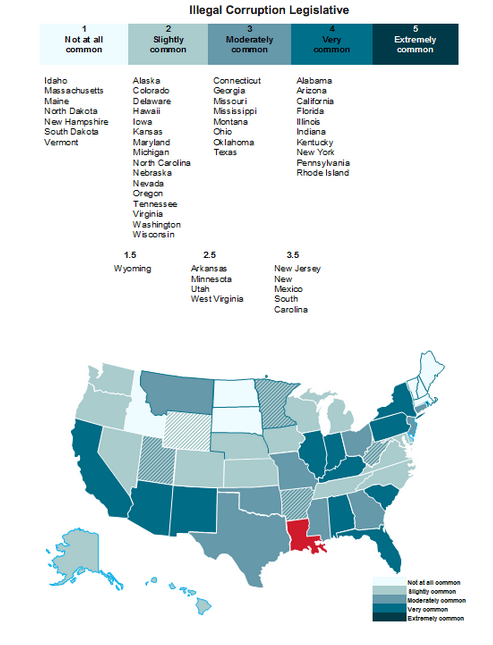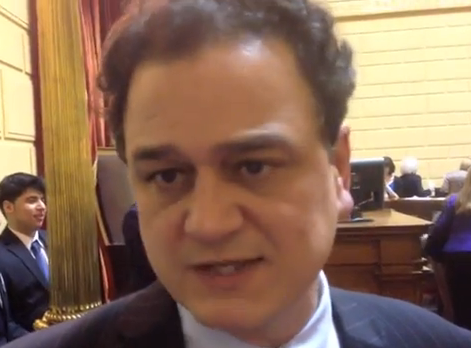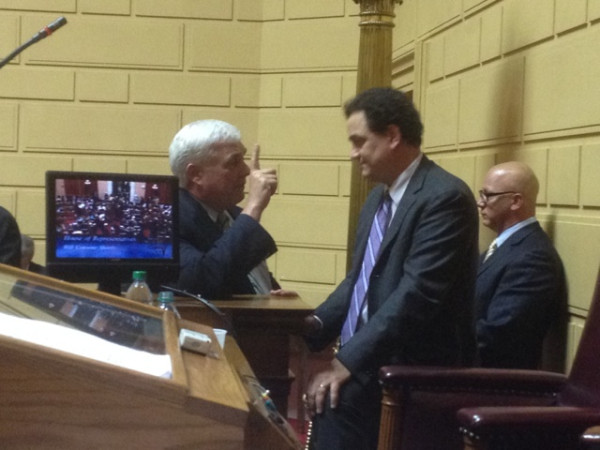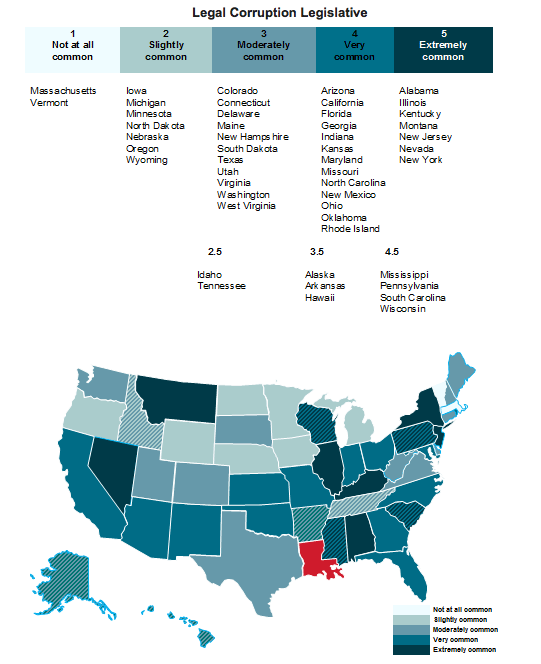 Rhode Island journalists think the legislative branch is more corrupt than the executive branch, according to a new survey by the Edmond J. Safra Center for Ethics at Harvard Law School.
Rhode Island journalists think the legislative branch is more corrupt than the executive branch, according to a new survey by the Edmond J. Safra Center for Ethics at Harvard Law School.
Responding local reporters said corruption, both the illegal and legal kind, is only “slightly common” in the Ocean State executive branch of government compared to both kinds of corruption being “very common” in the legislative branch.
The study made note of this discrepancy in Rhode Island and New York. “Among the states in which legislative branches score 4, New York and Rhode Island are particularly interesting since illegal corruption is perceived to be only “slightly common” in the executive branches in these two states,” it said.
Respondents were asked to rank state-level corruption as either 1) Not at all common; 2) Slightly common; 3) Moderately common; 4) Very common; or 5) Extremely common. Author of the analysis, Oguzhan Dincer, an economics professor from Illinois State University, wouldn’t say how many Rhode Island reporters participated but he did say RI was not one of the state’s for which they had difficulty getting responses.
The study looked at both illegal and legal corruption. “We define illegal corruption as the private gains in the form of cash or gifts by a government official, in exchange for providing specific benefits to private individuals or groups. It is the form of corruption that attracts a great deal of public attention,” says the paper. “A second form of corruption, however, is becoming more and more common in the U.S.: legal corruption. We define legal corruption as the political gains in the form of campaign contributions or endorsements by a government official, in exchange for providing specific benefits to private individuals or groups, be it by explicit or implicit understanding.”
Rhode Island was one of 10 states which ranked illegal corruption in the legislative branch as being “very common” and no state did worse than RI in this category. But a full 11 states ranked worse than Rhode Island when measuring legal corruption.
You can read the whole paper here.
]]>
 Last week I discussed Gordon Fox’s guilty plea for bribery, fraud, and filing a false tax return with students in my introductory sociology class at the men’s medium prison. Their reactions were immediate and articulate: one indignantly remarked that he himself had stolen a great deal less money than the former speaker, and yet was serving a longer prison term. Where, he wanted to know, was the justice in that?
Last week I discussed Gordon Fox’s guilty plea for bribery, fraud, and filing a false tax return with students in my introductory sociology class at the men’s medium prison. Their reactions were immediate and articulate: one indignantly remarked that he himself had stolen a great deal less money than the former speaker, and yet was serving a longer prison term. Where, he wanted to know, was the justice in that?
“You might expect stealing from a guy like me,” he said, baring his arms covered with tattoos. But Gordon Fox had an extra responsibility to behave ethically, as an elected representative who specifically undertook to safeguard the common good.
Much data has shown that rule of law applies differently to different groups of people. One need only read the New York Times’ coverage of Ferguson, or Michelle Alexander’s award-winning book, should one need convincing. While this is deplorable everywhere it occurs, my student’s point was straightforward: that those who we elect to care for the collective should be held to a higher standard of behavior, not a lower one.
Rhode Island has been the laughingstock of the country for well over a century for our unwillingness confront political corruption. If there was any doubt as to the need for reinstating the state ethics commission’s authority (famously dismantled in 2009), one might think such doubt would be assuaged by this most recent display of selfishness and disregard for Rhode Islanders, our tax dollars, and our intelligence.
We need more than Governor Raimondo’s milquetoast pro-forma comment that, “the situation is unacceptable” or current Speaker Nicholas Mattiello’s lackluster statement that he is “disappointed.” We need meaningful action from our leadership. Revisiting the ethics commission would be a good start. A real campaign finance bill would also help. We need for everyday Rhode Islanders to do more than wring their hands and go back to work.
More than that though, our leadership must understand—not just claim to understand—that holding public office is a privilege. Like being a parent or a teacher, it means the onus is always on you to be the “good guy.” You are never off the hook.
Former Speaker Fox should be punished to the fullest extent of the law. His behavior is an insult to all of us who work hard to make Rhode Island a good home and a good example.
]]>News, Weather and Classifieds for Southern New England
]]>
Gordon Fox is guilty, and I’m not surprised. I’m the guy who ran against the former Rhode Island speaker of the House in 2012. From the first days of our campaign, I pointed to the corruption that seems endemic in Rhode Island’s political structure.
At the time, nobody seemed to believe me. They denied it was happening. They made excuses. They said that it was just the way things are.
Many politicians who are still in office turned out to support Fox. They campaigned for him. They walked with him. They stood in front of the polls on Election Day and told voters to vote for him. They felt at the time that the status quo was better than advocating change.
The media were also complicit. During the campaign, I was faulted again and again for not being a serious politician. I was belittled for keeping my campaign grassroots and not raising a war chest. They dismissed the pay-to-play connections we drew between campaign contributions from the auto body industry and votes cast.
Our very own RI Future said that Fox was “by no means a dark force or a dirty politician. … On the contrary, he’s a good man trying to succeed in an often cutthroat business.” RIPR’s Scott MacKay bluntly opined, “…anyone who believes that Binder can get nearly as much done for the capital city as Fox, arguably the state’s most powerful politician, must believe that elephants can fly.” The pigs started flying when Fox resigned in March of 2013.
And nothing much has changed. Campaigns are still decided, by and large, by who raises the most money. Campaign contributions buy political influence in Rhode Island. Licenses are granted, tax breaks are given and issues are decided when you give contributions to the right politicians.
During the 2012 campaign, Gordon Fox lied. He lied to the press. He lied to the voters. Now he’s admitted his guilt.
He’s confessed to stealing more than $100,000 from his campaign fund, filing fraudulent tax returns, and taking a bribe for a liquor license. If you or I were charged with these offences, we would be facing decades in federal prison. Instead, he’s copped a plea in exchange for three years — one year per charge. It doesn’t seem sufficient.
In Rhode Island, voters have a bad habit of keeping people around who don’t deserve it. We brush away fault and blame, and shrug because “It’s the ways the system works.”
The system still doesn’t work for citizens and taxpayers. Since being anointed as speaker, Nicholas Mattiello has collected more than $100,000 in campaign contributions, even though he ran unopposed in the last election. Do those dollars really buy nothing?
When will this change? How will this change?
The General Assembly could police itself. It could eject members who accept campaign contributions that influence their votes. It could end the practice of late night back room deals. It could enact ethics and campaign finance reform.
We could create a smaller full-time legislature that pays members a living wage so they don’t have to be wealthy or take bribes to survive.
Will they? Probably not.
The next election is in 20 months. We need citizens to start running today for these jobs on the promise of these changes. It’s time to stop voting for the devil we know and instead look for people who are honest and true.
During a televised debate, Gordon Fox accused me of telling tall tales. I didn’t. He was the liar.
Keep that in mind the next time you see an “amateur” taking on a pro.
– Mark Binder, Providence, March 2015
See Fox Lie…
]]>
 Former House Speaker Gordon Fox admits he took a bribe and used campaign cash for personal purposes.
Former House Speaker Gordon Fox admits he took a bribe and used campaign cash for personal purposes.
In the first transgression, he stole from the citizens of Providence to get rich quick. In the other, he stole from State House special interests because he wasn’t. One of these is a political sin of the highest order. The other is not good, but not nearly as bad.
Selling your vote is among the worst crimes a public official can commit. Fox says he did this in 2008 as a member of the Providence Board of Licensing when he accepted $50,000 in exchange for supporting a liquor license application to a Federal Hill restaurant. In doing so, he stole from the his hometown the right to a fair hearing. He robbed Providence of democracy. Opponents of the liquor license application may well have reason to re-visit the issue, but they are by no means the only victims.
For $50,000, Gordon Fox crushed the notion that everyone has an equal chance in the Ocean State. He cemented the belief that Rhode Island is a pay-to-play state, undoubtedly the single biggest stumbling block to enticing people to live and do commerce here. Anytime a public official places a higher value on their own finances than on democracy society is the victim, and this is especially true with blatant bribery.
Conversely, when Fox spent $108,000 from his campaign accounts on personal expenses, he stole more from politics than from society. Elected officials should never lie, and we’ve got a lot of reasons to doubt Fox’s sincerity, but I’m not as mad at him for this one.
The reason any House speaker has $100,000 in a campaign account to abscond with is because special interests gave it to them hoping it will serve as a quid pro quo for political favor. The line between this legal activity and a bribe is blurry at best, and good government scholars disagree exactly where it falls. Only the explicit request for action separates campaign contributions from bribes. But both diminish democracy, and the idea that we all have an equal shot. Money corrodes democracy, as an illegal bribe and as a perfectly-legal campaign donation.
Other than for his personal use and his own reelection, Fox spent his campaign cash on lavish dinners for legislators, targeting political adversaries and helping political friends. Current Speaker Nick Mattiello does this too. This is why the General Assembly, here and in other states, as well as Congress, generally serve powerful special interests first and the average citizen second. Because the average citizen can only offer their vote and their support, and this commodity is entirely less fungible than cold hard cash on hand.
Don’t believe me? Consider the political insider take on Fox’s transgressions, according to RIPR blogger Scott MacKay: “…in Rhode Island political circles, the biggest rule he broke was the iron, if unofficial, Statehouse cliché: Don’t take a dime while you are serving in the General Assembly. Then cash in for as much as you can make later. By living above his means as a lawmaker (fancy house and late-model Audis in driveway), Fox ruined his chances of getting rich as a lobbyist when his tenure as speaker was over.”
Instead of becoming a wealthy lobbyist, I hope Gordon Fox is able to find redemption by becoming an advocate against the actions he took to build personal wealth and political power. He owes Rhode Island at least that much.
]]> Gov. DiPrete dumpster-diving for his bribe, Mayor Cianci convicted for running a corrupt criminal enterprise, and a myriad of law enforcement agencies raiding Speaker Fox’s office. It’s easy for any of RI’s even casual political observers to rattle off a handful of dramatic events of convictions for or allegations of corruption. Among the exhortations to abolish the option to cast a vote for a single party (the “master lever”) was a suggestion that corrupt practices damage economic growth and that such practices would limit business growth in the state.
Gov. DiPrete dumpster-diving for his bribe, Mayor Cianci convicted for running a corrupt criminal enterprise, and a myriad of law enforcement agencies raiding Speaker Fox’s office. It’s easy for any of RI’s even casual political observers to rattle off a handful of dramatic events of convictions for or allegations of corruption. Among the exhortations to abolish the option to cast a vote for a single party (the “master lever”) was a suggestion that corrupt practices damage economic growth and that such practices would limit business growth in the state.
Color me skeptical. The problems of corruption tend to come when it overwhelms the reliability of basic government function. When it takes a greased palm to move services to act, this is a problem of corruption. When government is slow to act due to backlog or how it functions isn’t clear aren’t problems due corruption, but with bureaucracy and the unutterable phrase of a “too small budget.”
When marquee political names go down under a cloud of corruption, it sticks in the mind. So despite the inconclusiveness of various measures of political corruption in determining where Rhode Island ranks among states, we maintain a deep distrust of our government. And yet I’d gamble that only a small handful of Rhode Islanders have ever had to hand an official a bribe, and that if they have, there’s a high likelihood that official was charged with corruption at some point after.
I think that oftentimes we use “corruption” as a shorthand for all our frustrations with government and the political process. It is a word that encompasses our frustrations so well. It also makes it easier to prevent compromise. Facing an entrenched interest and a set of people who truly believe they are doing their best? Corruption. One cannot negotiate with corrupt forces; they must be utterly destroyed.
Thus when I see the usual suspects crowing over abolishing the master lever receiving a unanimously affirmative vote in the House as though it heralds the dawn of a new era I can do little but shake my head. Does anyone seriously think that removing a simple though confusing voting mechanism will really alter the balance of power in Rhode Island? Why is this energy not focused on better achievements, such as reducing the influence of money in our elections, fostering greater democratic participation, or even simply increasing the ability of constituents to access their representatives?
It’s far easier to focus on sideshows that don’t require much reflection about the government we truly want or require consensus-building. One thing the recent Gallup poll on trust in state governments noticed is that less-populous states are more trusting than more-populous states. I think that’s too simplistic; I think it is that more urbanized states are less trusting than less urbanized states. Rhode Island isn’t like other low-population states. As a highly-dense state population-wise, it’s virtually impossible for seriously corrupt practices to take place without the state’s media hearing of it. Contrast this with states where multiple small towns might be covered by a single reporter or news source and separated by vast geographical distances.
This also applies to the “you gotta know a guy” theory. That theory is brought up especially by people who do not, in fact, know a guy. Due to Rhode Island’s urbanized nature, the vast majority of people served by the state’s bureaucrats don’t know them. It’s a reasonably basic sociological principle that faceless bureaucracy breeds alienation; and undoubtedly Rhode Islanders feel alienated. Contrast that with a small town, where the local bureaucrat might be your childhood friend and knows everyone on sight. It’s much harder to feel alienated from them; it’s also far easier to forgive their transgressions.
But reducing alienation is not half as sexy an issue as “fighting corruption.” For one, it requires thoughtful investment in government and its employees; not a high priority for our fair-weather government reformers. And it offers none of the drama. No one is ever dragged out in handcuffs for alienating the citizenry. Target 12 and the I-Team don’t focus on callous government employees and process. “Bureaucratic processes confuse, frustrate citizenry” isn’t a Pulitzer-winning story.
To me, the hoopla over the master lever signals the lack of seriousness among so-called “leaders” for addressing problems within Rhode Island’s government. It’s a shallow issue for shallow people; up there with tossing loads of cash at 38 Studios (or any other corporation looking for a handout) or cutting taxes of the already-wealthy.
]]> There’s a great free event at Brown next Wednesday, about the biggest threat to American democracy — and how we can fix it. It’s cosponsored by a number of great orgs, including mine: Demand Progress.
There’s a great free event at Brown next Wednesday, about the biggest threat to American democracy — and how we can fix it. It’s cosponsored by a number of great orgs, including mine: Demand Progress.
This will undoubtedly come as a shock to many who view Rhode Island through the over a century-old prism of “a state for sale, and cheap” created in 1905 by journalist Lincoln Steffens when documenting how the Republican Party stayed in power here. Or those like Bloomberg Businessweek, which used a corruption trial over a decade old as an example of our supposed corruption.
According to the Integrity Index, Rhode Island leads the country in its Open Meetings laws, while staying within the top 15 for all other categories which also included Freedom of Information (ranked 10th), Whistleblower Protection (in a four-way tie for 14th) and Conflict of Interest (ranked 15th). Rhode Island scored a 69.77% out of a 100 percent scale.
While it’s no cause for celebration (and is troubling for the nation), it continues to resist against the falsified perception that Rhode Island is somehow more corrupt than other states. Legally, corruption is the least tolerated in Rhode Island. This sort of information strikes a mortal blow against those that argue that corruption is more permissible under Rhode Island law when it’s pointed out that incidences of corruption in Rhode Island are middling to low when compared against other states.
Given that Rhode Island is joined by New Jersey and Illinois in the top three in the integrity, it’s hard to argue with the conclusion of the BGA’s president and CEO Andy Shaw, who suggests that because of their high-profile reputations for graft and corruption, all three states have passed tough laws to prevent it. This contrasts with states like Montana and Wyoming, which have weak anticorruption laws, likely because it hasn’t been in the public eye.
No one should suggest Common Cause RI pack its bags, though. Unless grading scales have significantly changed since I left school, a 69.77 is a D+, which is passing without much room for maneuver. There’s a lot of work left to get that into the 90s. So critics shouldn’t stop speaking up, they should just tone down the hyperbole unless they want to find themselves with their pants on fire.
]]>
Whenever a government makes a decision to spend money, or designs a regulation to right a wrong, it creates a business opportunity. If you reject, as I do, the Tea Party trend toward “all government taxation and spending are bad,” then you are left with a few questions.
- How do you protect the system from corruption and undue influence?
- How do you maximize value for taxpayers?
Over the past few years (decades?), Rhode Island’s legislature has done a poor job on both counts. In this article, I’ll focus on the first question.
Don’t re-elect corrupt officials
Every day new fingers are pointed about improprieties and influence on everything from auto body regulation to contract steering. Some legislators appear to profit directly. Others direct state dollars to their partners and acquaintances. Others win friends and get financial contributions and other forms of support from vested interests in exchange for line items, sweetheart contracts and back room deals.
It’s revolting.
On a Federal level, much of this institutionalized corruption is legal. Peter Schweitzer, in his disturbing book, Throw Them All Out, outlines the methods that the so-called, “The Permanent Political Class” use to generate personal wealth for themselves and their friends. According to Schweitzer, there are no solid rules against United States senators, representatives, and even the president, from using their advance and insider knowledge of federal government legislation and regulations. Schweitzer goes into detail about deals made by Democrats and Republicans alike that include advanced IPO purchases, land buys relating to federal funding and so on. It’s pretty horrifying stuff.
Schweitzer also talks about how businesses leverage their profits based on advance knowledge, insider knowledge and the simple massive power of Federal spending to “earn” billions of dollars. The equation is simple. Businesses with ties and links and lobbyists earn a better return than those who operate on a “level” playing field.
Here in Rhode Island, we seem particularly inept and vulnerable to these sorts of machinations. We are a small state, so it’s almost a certainty that a legislator proposing a bill will hear from the constituency who will benefit from it. Indeed, where else ought a legislator turn to learn about a particular regulation?
It’s almost inescapable. For example, when I was discussing the challenge the state faces dealing with the decades of politicians granting union benefits in exchange for union support, my wife, who is a teacher and a union member said, “Don’t touch my pension!”
I think that constitutes “influence”, don’t you?
Subversive “Support”
But other forms are more insidious. As a newly declared candidate, I began to receive “questionnaires” from organizations asking if I wanted their support. The first two that came in, Planned Parenthood and the Sierra Club, were fairly easy to answer.
I’ve always been a 100% supporter of a woman’s right to choose, a proponent of education, and an opponent to government imposition of will on a person’s body. I’ve always been a believer that one of the jobs of government is to protect, nurture and restore the environment.
But I noticed that these letters were lobbying me before I was even elected. I learned, for example, that Rhode Island law requires notification of a husband, if a wife wants an abortion. Planned Parenthood asked if I would try to change that. I said I wasn’t sure, yet. I later learned that how the organization avoided that situation was to not ask women if they were married.
A few days later, the Right to Life questionnaire came in, and I pitched it in the trash.
I’ve gotten a few Union questionnaires, too. In general, I’m a huge supporter of trade unions. I believe that workers have the right to organize and bargain collectively. But my opinion on some issues is nuanced. One political adviser suggested that I avoid using these questionnaires to address subtle issues, but I had already sent in one:
5) Would you support standards that would link public economic development assistance to companies that create good jobs, pay fair wages, provide decent benefits and comply with environmental, labor and other laws? (Development Assistance is defined as abatements, loans, grants, contracts, tax breaks, etc).
COMMENTS: YES. However, as the 38 Studios and so many other failed initiatives show, I am wary of providing economic development assistance to companies who are only moving here because of that assistance.
More and more questionnaires. One lured with the promise that all of the people they supported won their elections. Another flat out threatened…
The day after the recent massacre in Colorado, I got a flier from the NRA asking me to support their agenda and warning me that, “If you choose not to return a questionnaire, you may be assigned a ‘?’ rating, which can be interpreted by our membership as indifference, if not outright hostility toward Second Ammendment-related issues.“ (boldface theirs!)
My position? Guns do kill people. I oppose assault weapons in the hands of insane people. The culture of handguns in this country is killing people in Providence every month. Is there anything good about this? I don’t think so. (Although I have to admit that in the darkest days of the Bush administration, I could understand the idea of buying a gun to protect yourself against the government.) If I’m elected, I’ll consider increasing gun regulation and limiting the purchase of devastating weapons. Make of that what you will, NRA, I will not be returning your form.
Vigilance, Integrity and Mindfulness
I am not running for office to make a buck. I want to make our state better, and one of the most powerful ways is to get the corruption out of government.
When that legislator makes (or protects) a buck for himself or his family or his business, or receives a campaign contribution – or the promise of votes, volunteers and support at the polls – the vote is plainly unethical.
The next question people ask is, “How will you avoid that yourself?”
It’s a challenge. Any vote for a tax cut could benefit me. A tax break for the arts would benefit my friends. Any vote for increased funding for education will benefit my family — and certainly benefit my children, who are in the public schools.
I can only promise that I will pay attention and always ask, “Who profits? Who loses?”
And be very very very public about the process.
]]>
